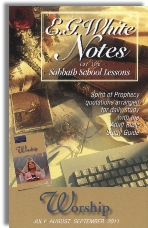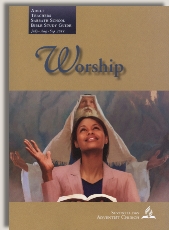|
||||||||||||||
Commentary on "Worship and the Exodus: Understanding Who God Is"
Day 6: Thursday, July 7, 2011 - "Show Me Your Glory"
Overview
This day’s lesson is based on Exodus 33:12-23 in which God acknowledges that He knows Moses by name, that He will send His presence with him as he leads the people. Moses was pleading with God to accompany him, because God had previously said He’d send an angel to go with him. Moses asks to see God’s glory, and God agrees that He will hide Moses in a cleft of a rock and allow His glory to pass by him.
The lesson concludes that Moses wanted to see God’s glory, “something that would make him realize even more his own sinfulness and helplessness and, hence, his utter dependence upon the Lord.” It asks how well the reader knows the Lord, how the reader can know Him better, and how he/she can learn to worship “in a way that will give you a better appreciation of God and His glory”.
Observations
The Teachers Comments on page 27 have some disturbing statements and questions:
“When [Moses] worships, he recognizes that God has sufficient power to use him in an effective way. How can worship of God give us confidence?
“Our God is a big God. There are many valid ways to worship Him. How can we discern which ways are compatible with what the Bible tells us is correct and spiritually honest worship and which ways compromise or contradict the spirit of true worship?”
The lesson’s use of “worship” is consistent with the way I understood the word as an Adventist. Sometimes the hour of the church service was called “The Church at Worship”, or “The Worship Hour”. “Worship” was commonly understood to describe the time when one quietly read the Bible or gathered with the family to read the Bible or a devotional book. “Morning and evening worship” were icons of true faith; families that did not have the “family altar” were considered slack in the things of God. In other words, Adventists understand “worship” to be the time a person sets aside to “hear from God”, to know more about him.
Not surprisingly, this idea is reflected in the Sabbath School quarterly. As Moses worships God, he begins to see God is powerful enough to use him effectively. Worship gives one confidence. The lesson also says that when one looks at what Moses had been called to do, at the challenges he had to face, “no wonder he felt this need to know God.”
The last question of the day’s lesson, “How can you learn to worship in a way that will give you a better appreciation of God and His glory?” reveals the inside-out understanding of worship that underlies the Adventist worldview.
What is worship?
Worship, however, is defined as reverence or obedient service that we offer to God. It is us acknowledging God as He is—not as we imagine Him to be or think He is or desire Him to be—and giving up our intellectual control over Him. Worship is not “hearing from God” as a primary function. It is offering to God our vulnerable dependence and gratitude and fear and joy in recognition that He is God and we are totally in a separate category from Him. We are creatures whom He has redeemed.
It was disorienting at first, when we began attending Trinity Church, that the pre-sermon singing was called “worship”. That seemed backwards. In Adventism, the sermon was what constituted the bulk of “worship”, and the singing was “the hymn” or “song service”.
I have come to see that in the Christian community, designating the singing as “worship” is the correct label. That is the time during which believers offer to God their emotions, their declarations of faith and belief, their commitment to honor Him. Worship is not about “seeking to know more about Him and His ‘way’.” It is about giving God everything that is in our hearts.
Moses and God’s glory
When Moses requested to see God’s glory, he wasn’t trying to get more of God, to know him better, to be reassured that He was powerful enough to use him. Rather, the context is that Moses, as the mediator of the Mosaic covenant, desired God to confirm His promise to continue to accompany this already-rebellious people in a way similar to His confirmation of His covenant with them at Sinai. Moses was acting not primarily as an individual wanting “more”; he was asking God to confirm His presence and leadership of the difficult people whom Moses represented. Moses needed to know that God would be in charge of this exodus, not merely himself. Moses didn’t need to be “fortified” with prayer in order to do his job. He needed God Himself to lead the people.
Moses could not function as the mediator between Israel and God if he didn’t know for sure that God would place His presence among them. An angel would not do. Moses needed God to be in charge.
Knowing God
The lesson emphasizes that true worship is “God-centered” and should give the worshiper a “sense of self from the true knowledge of God gained thereby” (p. 27).
This formula is inside-out and backwards. A person cannot worship God without already having a sense of who He is. Worship is not taking time to figure out God. Rather, worship flows out of a heart that has met the Lord Jesus.
It is not true that “there are many valid ways to worship Him.” No! Worship is not determined by culture or human desire. Worship is described and revealed by God through His word.
There is only one correct way to worship God, and that is by believing in the Lord Jesus and accepting His blood as the sacrifice for one’s sin. Only when one believes can one be born again. Belief is not an intellectual exercise, an acceptance of a paradigm that “works for me”. Belief, rather, is submitting to the Bible’s revelation of our true relationship to God as natural people: dead in sin and objects of wrath (Eph. 2:1-3).
And you were dead in the trespasses and sins in which you once walked, following the course of this world, following the prince of the power of the air, the spirit that is now at work in the sons of disobedience—among whom we all once lived in the passions of our flesh, carrying out the desires of the body and the mind, and were by nature children of wrath, like the rest of mankind.
When we recognize our true identity, then we must repent and place our faith in the blood of Jesus. When we do that, we are born again by the indwelling Holy Spirit (Eph. 1:13-14).
In him you also, when you heard the word of truth, the gospel of your salvation, and believed in him, were sealed with the promised Holy Spirit, who is the guarantee of our inheritance until we acquire possession of it, to the praise of his glory.
When we are born again, then we know God. In fact, this is the only way to know God. Jesus said in John 3:18:
Whoever believes in him is not condemned, but whoever does not believe is condemned already, because he has not believed in the name of the only Son of God.
Worship is not about trying to drum up a response to God and to figure out how to know Him. On the contrary, worship is a spontaneous reaction to who God is, as He reveals Himself to be.
Moses was not trying to have an experience with God that would show him his own sinfulness, helplessness, and dependence. He already knew those things. Moses was seeking confirmation that God was keeping His covenant.
The need of Adventists
I say with the conviction of one who grew up Adventist, loved being Adventist, and sincerely believed Adventism was the “closest thing to the truth”: Adventists do not know who God is.
The Adventist “God” is defined by Law, and Jesus is the lesser “god” that the Father sent to uphold and exonerate the Law.
This belief is heresy, according to the Bible. God is not defined by Law. God gave the law as a gift to Israel when He made them a nation. It is not the transcript of His character, and it does not define how we may relate to Him.
The Lord Jesus defines and is the means of our ability to relate to God. He fulfilled the law...and at any rate, the law was given to cause sin to increase, not to keep people from sin (Rom. 5:20; 3:20; Gal. 3:19).
Adventists struggle with “worship” because they do not have any knowledge of the true God revealed in Scripture. We don’t have to try to figure out how to experience Him. He reveals Himself to us, and our response is to submit—not only in theory but to submit our intellects—to His word and His truth.
We have to admit we can’t understand Him, and we have to lay down all we think we know in order to embrace Him. We have to submit our minds and hearts to Him and receive His blood and His Spirit.
Then we can truly worship Him.
The worship of the non-born again will be the legitimate fear and acknowledgment that He is Lord when He returns. Fear is the correct response to a holy God when one approaches Him without the proper Sacrifice.
Summary
- Worship is not sitting and receiving religious teaching, family devotions, personal devotions, or listening to sermons.
- Worship is a natural response of joy, gratitude, praise, and repentance from the hearts of those who know God.
- Worship is not our attempt to know God. It is our offering to God of our praise and grief and joy and surrender.
- Moses was seeking God’s confirmation of His continued presence with Israel.
- Moses was not trying to have an experience that would enhance his sense of self or his need of God. He already had that.
- Moses wanted God’s evidence that He would accompany Israel, not merely send an angel as He had previously said.
- There is only one way to properly worship God: the way the Bible reveals.
- Only when we acknowledge and repent of our natural sin and receive the blood of Jesus as the complete payment for all our sin can we really worship.
- Jesus is the One Way to approach the Father. Only in Him can we have eternal life, and only when we have eternal life can we actually worship God.
Copyright 2011 BibleStudiesForAdventists.com. All rights reserved. Revised July 6, 2011. This website is published by Life Assurance Ministries, Glendale, Arizona, USA, the publisher of Proclamation! Magazine. Contact email: BibleStudiesForAdventists@gmail.com.
The Sabbath School Bible Study Guide and the corresponding E.G. White Notes are published by Pacific Press Publishing Association, which is owned and operated by the Seventh-day Adventist church. The current quarter's editions are pictured above.
Official Adventist Resources
Standard Edition Study Guide Week 2
Teacher's Edition Study Guide Week 2
Easy Reading Edition Study Guide Wk 2
Search the Complete Published Ellen G. White Writings
Please Support This Project


